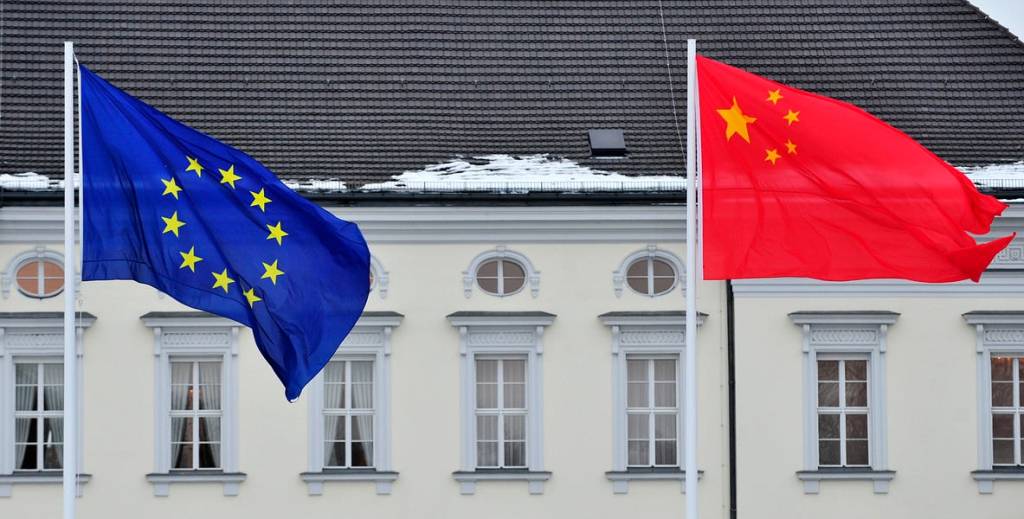After more than six years of slow and mostly inconclusive negotiations, the European Union and China seem to be inching to a deal on their Comprehensive Agreement on Investment (CAI). Yet whatever concessions Beijing might have offered to Brussels in an effort to conclude the negotiations before the change of administrations of Washington, it would be a grave mistake for European negotiators to say yes to the Chinese offer.
China’s goal is not to foster economic integration with Europe but to poison the transatlantic relationship before it has a chance to recover in the aftermath of Donald Trump’s departure from the White House. Not only that, the CAI is bound to drive a wedge between EU member states and between EU institutions—most notably the European Commission and the European Parliament.
To be sure, there was a rationale for the negotiations. Investment and business relations between the two economies are governed by an inconsistent patchwork of 25 bilateral agreements that China negotiated with individual countries, offering little in the way of reciprocity.
While European legal systems do not treat foreign-owned companies any differently from those in domestic hands, China imposes stringent joint-venture or licensing requirements on foreign businesses that want to enter its markets, while keeping some sectors, prominently online and print publishing, entertainment, and broadcasting, siloed off from foreign competition. The production of Volkswagen and Audi automobiles in China, for example, is made possible only through Volkswagen AG’s joint ventures with Chinese state-owned enterprises FAW and SAIC, in which the German giant holds only minority stakes. It was not wrong to believe that putting Brussels in charge of the negotiations, instead of national capitals, gives Europe leverage that member states, many of them small, do not have.
For some in Brussels, the ability to sign substantive investment agreements with China, without relying on the United States, is valuable in its own right—a sign of Europe’s geopolitical weight and its “strategic autonomy,” as the fashionable turn of phrase goes.
That is wrong. As the Greens’ MEP Reinhard Bütikofer put it, “to forgo the opportunity of teaming up with a like-minded partner when you could, just because you believe you should insist on going it alone to demonstrate your ‘Augenhöhe’ [equal status], even if that ends up weakening the partnership and strengthening the bully, that is utter folly.”
Assuming that the deal would be ratified, the CAI would tie the hands of Europeans in controlling Chinese investment in sensitive sectors. After all, the main prize for China in the ongoing negotiations is to secure EU-wide protection for Chinese investment, bypassing the bloc’s new investment screening system, as well as measures that could be adopted on national security grounds by individual member states.
After years of stalling, Beijing may seem willing to grant the EU significant market access in sectors including financial services, manufacturing, and real estate in order to get the deal done. It is unlikely, however, that the agreement will touch the subject of human rights and forced labor—and it’s equally implausible that the Chinese would agree to an effective dispute settlement mechanism that would give recourse to European companies operating in China.
Alongside well-organized private interests, the divisive and mercurial character of the current U.S. president counts among the main reasons why some European governments are reluctant to take a more hawkish position on China. Germany, for example, has moved closer toward allowing Huawei access to its 5G network. Most other European countries are keeping their options open too, instead of rushing to impose bans on Chinese tech giants such the ones adopted or underway in the U.K., Finland, or New Zealand. With a new administration, however, the political case against closer coordination with the United States on 5G and other technology matters, including outright bans, will become weaker. That is precisely what Beijing is seeking to preempt.
But even if the CAI does not get ratified and a looming transatlantic quarrel is avoided, concluding the negotiations would be an own goal for the EU in and of itself. The European Parliament already signaled that human rights would play a role in its deliberations. Considering the widespread human rights abuses that followed China’s imposition of the national security law on Hong Kong and the growing awareness of Beijing’s atrocities in Xinjiang, Parliament’s acquiescence to the deal is out of the question. The agreement will also provoke pushback by many member states. Most prominently, France’s trade minister vowed to oppose the deal unless the issue of forced labor is addressed, and Poland’s foreign minister warned against a “premature” deal, concluded without “consultations and transparency bringing our transatlantic allies on board.”
A divided EU would also be a win for the Chinese Communist Party. As a result, the only way for the EU not to lose at this game is to refuse to play. The European Commission ought to shelve the negotiations at least until the possibility of a common transatlantic approach toward Chinese trade practices and technological challenges is explored after January 20. Those who argue that the EU can hold more sway over Beijing should also be able to recognize that a broader alliance of Western democracies can have more leverage still.
Dalibor Rohac is a senior fellow at the American Enterprise Institute. Follow him on Twitter: @DaliborRohac.






Please note that we at The Dispatch hold ourselves, our work, and our commenters to a higher standard than other places on the internet. We welcome comments that foster genuine debate or discussion—including comments critical of us or our work—but responses that include ad hominem attacks on fellow Dispatch members or are intended to stoke fear and anger may be moderated.
You are currently using a limited time guest pass and do not have access to commenting. Consider subscribing to join the conversation.
With your membership, you only have the ability to comment on The Morning Dispatch articles. Consider upgrading to join the conversation everywhere.